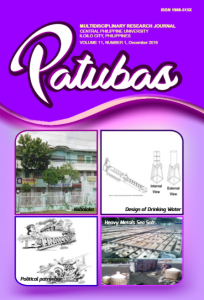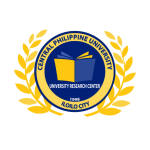Patubas Volume 11 No.1 2016

Patubas is published once a year under the auspices of Central Philippine University, Jaro, Iloilo City, Philippines.
Copyright © 2016 by individual authors and Patubas.
Published in 2016
Central Philippine University
Lopez Jaena, St., Jaro, Iloilo City
All rights reserved. No part of this publication may be reproduced or transmitted in any form or by any means, electronic or mechanical, including photocopy, recording or any information storage and retrieval system, without permission in writing from the authors or publisher.
For print ISSN 1908-515X
Publication ISSN 2672-3611
Opinions and facts contained in the articles published in this issue of Patubas are the sole responsibility of the individual authors and not of the Editorial Board, Patubas or Central Philippine University.
Jun Ozbert M. Haguisan, Ann Marie P. Alguidano and Isah Lou G. Nocal
ABSTRACT
Eating food contaminated with heavy metals could lead to poisoning, long term health problem and even death. One common substance needed for food preparation is salt. Salt can be mined as rock salt or harvested in the sea by evaporating the sea water. Salt can contain heavy metals. This study aimed to determine quantitatively the cadmium, manganese, lead and copper content of sea salt, sea water source and iodized salt. The sea salt and sea water samples were taken from four locations in Iloilo which have salt industry. Iodized salt samples were purchased locally from different grocery stores located in the city of Iloilo. The cadmium content was beyond the allowable limits in both sea salt, sea water source and iodized salt set by DENR, CODEX and WHO. Manganese in sea salt exceeded the allowable limits. Lead exceeded the allowable levels in sea salt and some in sea water source while lead was not detected in iodized salt. Copper was above the allowable limits in sea water source and only on Site C sea salt sample while the iodized salt did not exceed the limits for copper set by DENR, CODEX and WHO.
Dahlia H. Pescos and Nelson V. Golez
ABSTRACT
This project study presents an innovative way of constructing a drinking water treatment facility system within Central Philippine University. It starts with the preparation of a preliminary process flow that can treat raw water supplied by the Metropolitan Iloilo Water District to produce a potable drinking water supply. Laboratory scale experiments performed in the chemical engineering laboratories tested the effectiveness of the prepared process flow and after necessary adjustments, the relevant information necessary for the preparation of the final process flow and equipment design were collected. The final process flow and design of equipment based on the laboratory work results followed. The facility is composed of five major process tanks namely: coagulation, settling, chlorination, filtration, and treated water tanks. The facility can operate 24 hours a day, seven days a week and can treat 1.2 liters of water per minute. The flow of water in the facility is by virtue of gravity. It has a total land area of 456 square feet or 42.4 square meters and is located near the University Gymnasium. The drinking water treatment facility is estimated to cost PHP 154,000.00.
Ernesto S. Saquibal, Jr. and Ma. Lindy B. Saquibal
ABSTRACT
The study examined politics in Iloilo by looking into Ilonggo voters’ perceptions of patronage practices of local politicians, and how these conditions influence their attitude towards dynastic politics or intra-familial succession in the local level. A total of 384 respondents were surveyed through face-toface interview. Chi-square and Gamma tests were used to determine the significant relationships between variables. Findings of the study reveal that the use of patronage has contributed to the election success of the Governor, Congressman, Mayor and Punong Barangay to Some Extent (40.8%) and to a Great Extent (18.3%). One in four (24.5 %) of the respondents were Not Sure or Uncertain of its effect while 11.8 percent noted that its effect is Negligible. With regard to their attitude towards ‘dynastic’ politics or intrafamilial succession, one in five (22.1%) among the Ilonggo voters holds a positive attitude compared to three-fourths (74.5 %) who exhibit a Neutral Attitude towards these politicians. These findings thus suggest that the Ilonggo voter perceived that the extensive use of patronage has generally contributed to the election success of local politicians in the Province.
program to update students of school policies that affect them while studying at the University.
Edwin I. Lariza and DZ Patriarca-Lariza
ABSTRACT
This study described the growth and development of the Katin-aran Center and its contribution to the community and University. It used the exploratory and descriptive design. A focus group discussion with pioneers and key players validated the data. Katin-aran emerged as a response to the needs of the Social Work Department for practicum field placement. Soon it grew with established development concept, framework and effective methods in organizing communities. Because of its track record, the Center earned recognition here and abroad. It has reached its peak as separate foundation implementing multi-million empowerment projects. The impacts of its programs and services have been translated into people’s community involvement. Among the administrative factors that promote and hinder the development are, as follows: institutional support provided by the University; participatory and integrated/ holistic development approach; and the charismatic qualities and management style of the pioneer director combined with highly committed staff. However, the same factors created organizational problems and issues, namely: indeterminate structure, lack of a more definite framework for strategies, learning disability, and role confusion.
Mary ‘O T. Penetrante, Dimpna C. Castigador, Gilda G. Monsole and Lofel J. Diamante
The study entitled Strengthening LGU and CSOs Partnership Towards Participative, Responsive and Sustainable Development is a technical assistance project that aimed to capacitate the tourism office of the City of Passi and the CSOs in the locality to effectively address the prioritized critical areas as identified in the Citizen-driven Priority Action Plan (CPAP) through a multi-stakeholder participatory approach.
Specifically the study aims to: 1. assess the current interventions or programs of the LGU tourism office to address the priority areas as identified in the CPAP; 2. present the results of the assessment to the stakeholders; 3. capacitate the stakeholders to develop the intervention/action plan that will effectively address the critical priority area identified; 4. capacitate the stakeholders to develop a monitoring and evaluation plan to ensure that the action plan is implemented, corrective measures are undertaken, and; 5. assess the results/outcomes of the technical assistance provided to the tourism office of the City of Passi and CSOs including the changes (if applicable) in the Citizen Satisfaction Index System indicators.
The project used a multi-stakeholders’ participatory approach and was implemented in the City of Passi, Iloilo from November 22, 2016 to March 22, 2017. It focused on assessing the service delivery performance of the local government based on the citi en’s level of knowledge, availment, and satisfaction of tourism promotion program/services of the tourism office. Sixty (60) sample respondents were selected using the multi-stage sampling technique.
The project was funded by the Department of Interior and Local government through their LRI Technical Assistance project in the amount of Two Hundred Thousand Pesos (P200,000). Its target beneficiaries include, the City of Passi local government unit (LGU) , civil society organizations (CSOs), business sectors, associations, and other groups/sectors in the local community. Key activities include conduct of desk review, conduct of face-to-face interview, processing and analyzing data, preparing reports and presentation slides, presentation of results to the stakeholders, conduct of stakeholders planning workshop, preparing report.
